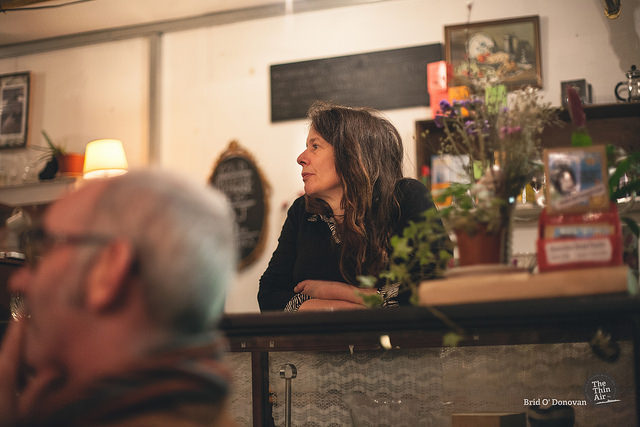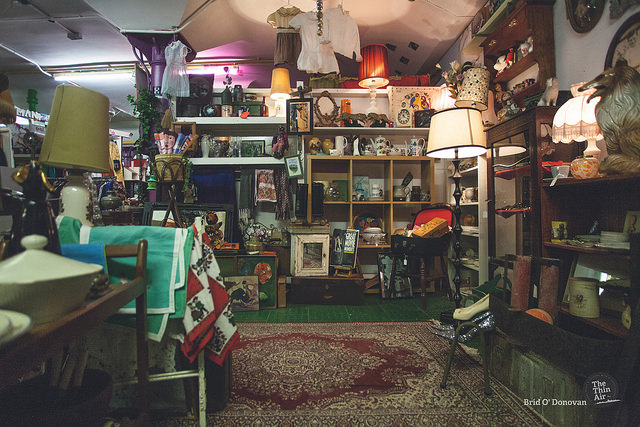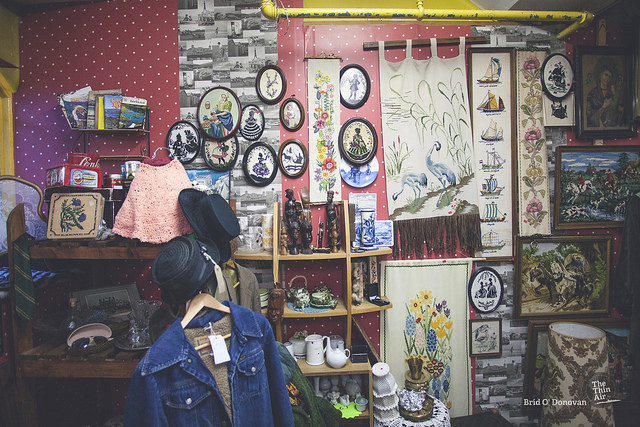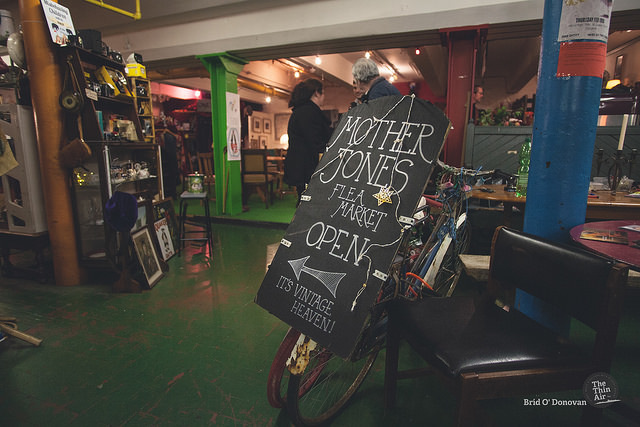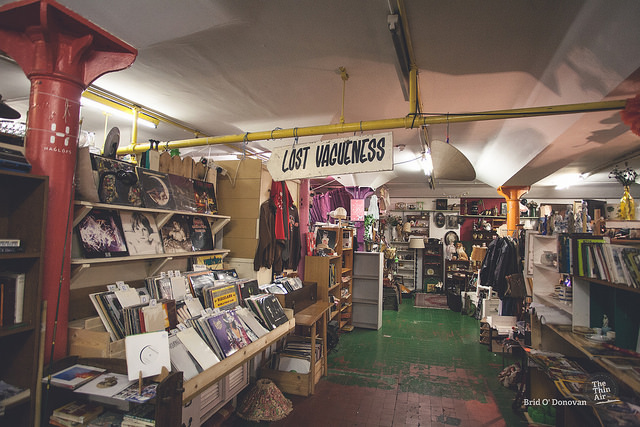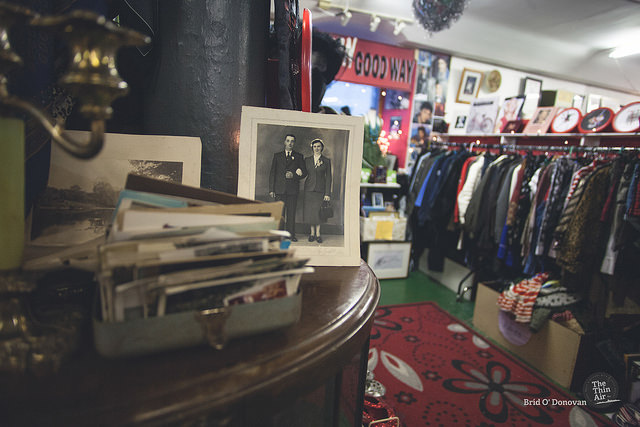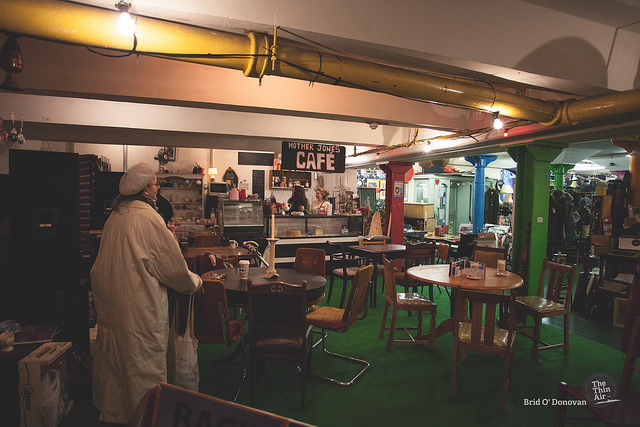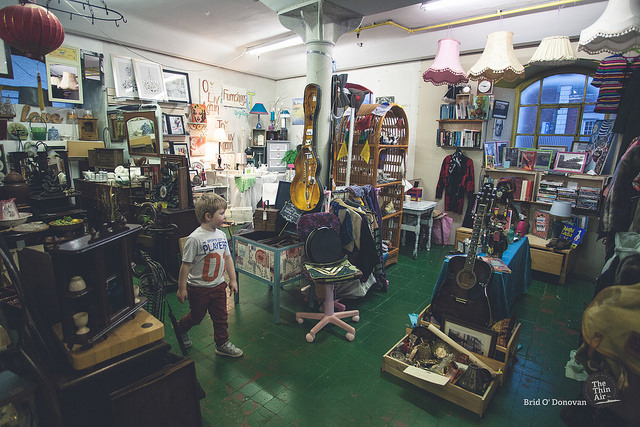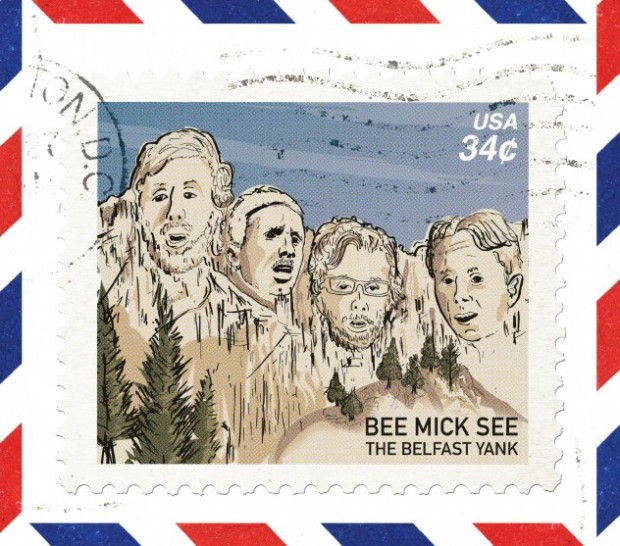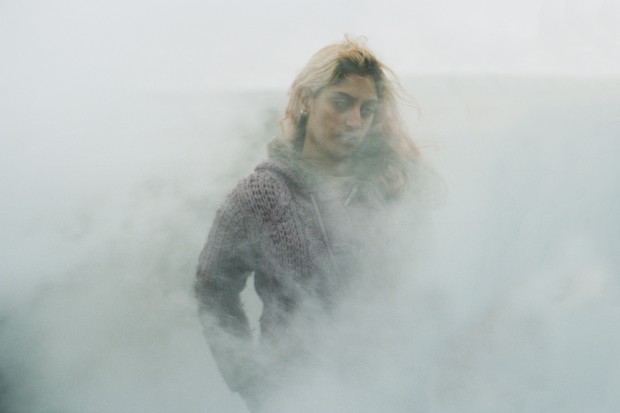Lorna Sherlock is the owner of Mother Jones’ Flea Market which is situated at the corner of McCurtain and York street in Cork city. Brid O’Donovan chats to her about passion for all things vintage and takes some stunning images of her shop.
Where the love for antiques and vintage all began.
I suppose it was my Mum. I grew up in Cavan but my mother lived in London, in Brixton. When she was growing up everything was bought in the markets. She met my Dad over in London, married my Dad and moved over here. Of course no one had anything in the 70s in Ireland so we used to get these parcels from England once a year and they were just big boxes of old Barbie dolls and Barbie doll dresses and everything and anything. Everything came from the junk shop and the markets. It was like Christmas when you got those boxes. Like half the country it all came from America or from England at that time. You didn’t have any charity shops or anything like that going on in Ireland at that time, you know.
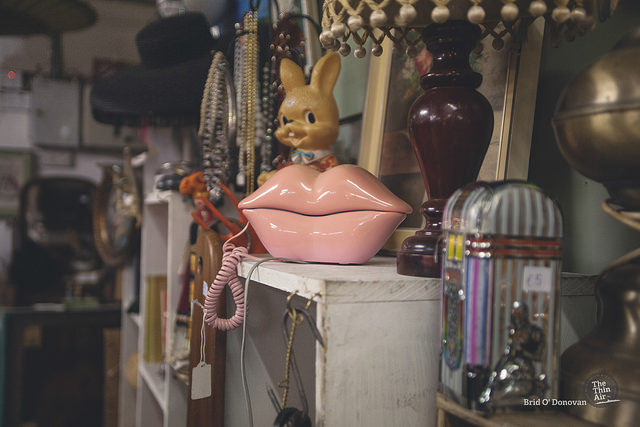
Setting up Shop and Closing up Shop.
I got into vintage and retro clothes and then I opened my first place in Cork twenty four years ago called Riddled with Gorgeous when my son Caoilian was born. I didn’t really know anything about second hand or vintage but I just got into it and learned it as I went along. Cork was amazing at that time. There was a great energy. Cottage industries were ripe. We hadn’t had the height of capitalism at that stage so you still had a large cottage industry. That was wiped out with the Celtic Tiger and everything else. But now you see it’s back. The Irish took capitalism and in twenty years and we ate and bate through it basically. Within those twenty years we turned around and said “Well, that wasn’t all it was cracked up to be, was it?”. We had Riddled with Gorgeous open for a couple of years, then I got pregnant again so we decided that it was too hard work because you are going away all the time, going to London and collecting and buying. So I gave it up and within a year I had opened up another place with another friend of mine called Hale Bopp down on Paul street. We did that for a couple of years and then I got into theatre with Corcadorca and welding. I did a Fás course and learnt how to weld. I was working with Corcadorca building sets for three years on a community scheme. I loved all of that. But I was walking up Brick Lane one day and the excitement I had getting off the train as I was going to go tatting, I thought to myself “Why am I bothering with theatre stuff when I get this buzz just as I’m getting off the train”. The excitement and the rush of it all. That what it is all about – finding that piece that no one else has spotted. One man’s rubbish is another one’s gold.
They Tell a Story.
I don’t know how I got into the furniture. I think it was just a natural evolution. I started on costume jewellery then from the 1950s and I loved that, especially from Victorian times onwards. In the 1950s it was really revolutionary because it was the first time women had disposable income. You had a huge increase in women in design and materials became affordable after the second World War. A lot of the costume jewellery would have been unaffordable to working class women. After the revolution in plasics, bakelite, cellulose, lucite, all of those plastics became really cheaply available. Woolworths and places like that started doing all these costume sets so the 1950s was really the revolutionary time for costume jewelry. You also saw those materials used in the house, the plastics, the formica and all of that. If you start looking at these pieces you start looking at working class history and culture through them and the development of the different materials.
I’m a socialist to the back bone. When you find these pieces they send you on a journey. You start researching and you find out more and more. It’s like when I found out about Mother Jones. This woman that was born on Blarney street here in the city. It was the reflection of all that through working class history and culture. Women in the 1950s were supposed to have more disposable time because of washing machines and all of these things. If you look at the hours that women work now compared to the first or second World War we actually have less leisure time. The whole revolution of the 50s with the washing machines and the irons meant that women were going to have all of this time.
The craftwork that would have been done in Irish furniture, the farmhouse furniture where every piece was probably three different things before it finished up as the product it is because nothing was wasted. You see all those different pieces and they tell a history, they tell a story. Then you find them and someone else is going to love them for another 150 years. We just got a beautiful table and two chairs there today and you can see where they have literally been knocked together in someone’s shed but they last a lifetime. They’ll last for 100 years and they’ve already 100 years old. Everyday you find something – another book in a second hand shop and that’ll send you off on another mission. It’s continuous. That’s what is so exciting about it – the history behind each piece.
In Between Shops.
Welding was right up my alley. I was working with a fire show at that stage. I was travelling around with the kids in the back of the van. We did a couple of years travelling around Belgium and Holland and France. Friends of ours had a fire company and we used to go off and travel with them. We lived in a squat in Holland for a summer while they were doing the shows. It was a big production. There was probably about 12 or 15 people working flat out from 8 o’ clock in the morning until 10 or 12 o’ clock at night so we did a lot of the cooking and all that. The kids had an amazing time, they travelled all over the place. They had a ball. It was pretty amazing. That’s where the welding came in to it again. We brought the fire show over from Holland to Cork for the 2005 city of culture and that was an amazing couple of weeks as well.
So I was doing the theatre work and you’re on the road most of the time, you’re away from the kids and it’s not like you can bring them with you. So I went back on the road doing the markets and the car boot sales in Mitchelstown and all of those places. Then we had those two summers that were the worst summers ever. I was driving down to Bantry and you couldn’t even get the van open because the rain was so bad so you weren’t making any money. There was nothing like this going on. I had always thought about a place like this but there wasn’t even anything like this in Dublin so I was unsure if it would work for the three days (Friday, Saturday, Sunday) if people would come over to this side of the city cos you know what Cork people are like – it’s two minutes from the city centre and you’d swear it was over in fucking Waterford the way people go on. So the rain kept coming and I spotted this place. It had a For Sale/For Rent sign above it but the sign kept going down and then popping up again. I rang Jack Lynch and I had not a fiver in my pocket. I was like “How am I going to pull this one off?”. I couldn’t keep going, I was getting really sick from travelling so much. So I met Jack down here and it was during the recession. Everyone was on a downer. So I told him my idea for this and he just started laughing and said “Well sure, look it, you might as well give it a go.” There was nothing going on at that stage. He’s such a cool guy, Jack Lynch and his son John. I think he thought “Sure what else is going to go in there, I might as well give her a go”. I think they are as surprised as I am that we are still here two years later.
Mother Jones.
The reason why it is called Mother Jones is because I knew of Mother Jones through my political reading and I could not believe that there was no celebration of this amazing woman, this trade union goddess. Even in Ireland there’s no knowledge of her, there’s no information on her. Theodore Roosevelt called her the most dangerous woman in America. She was incredible. She wasn’t a feminist, she was a socialist and she was the daughter of Cork. It’s a bit like Rosie Hackett. They have now given the Rosie Hackett bridge up in Dublin, which is the first icon that has been named in female recognition.
Finding people to set up shop.
That was through advertising. I did do a lot of work. I had no money and Jim Morrish, god bless his cotton socks really helped me there and sorted everything out. People were so supportive. So he got the printing done and I knew the vintage market, I knew the antique market so I just went out around advertising and people came! The week we opened we had a huge crowd, we had a lot of stallholders in that week. But a lot of them were arts and crafts and since it has developed. I never thought that it was going to be the way it is now. It thought people would come and go very quickly but the people started to fall in love with the place and wanted to stay. That’s how it evolved to what it is now where people are setting up small business’. The majority of people are just giving it a go for the first time. They haven’t done stuff like this before. A few of them have done buying and selling. A lot of people have moved on to new buildings, there’s a new place that has opened up – The Vintage Quarter. Records and Relics started out here. There’s loads of people who have come through here and have gone on to do great things.
Vintage Now, Compared to Then.
I’ve been doing this for twenty five years. Now, it’s at a completely different level. In two weeks time we are going out to do the fair out in Ballymaloe House for the Ballymaloe Vintage and Antique Fair. That’ll be lovely. It’s expanded, there’s so much going on with regards to vintage and retro and it’s really only exploded as it has in the past ten years.
People are getting back to their roots again. Cork was so exciting twenty years ago, it was an amazing place. We were living in the shop at the same time as renting it out for the first couple of nights that we were here. I remember we went in early one of the first mornings and we were bringing all the stock in and when we emerged from the shop that evening I remember walking out onto Winthrop street and there were buskers everywhere and the sun was shining and it was alive. It was vibrant and the young people were just so cool. Red Square, a vintage shop, was open at the time so it was a really hip town, Cork at that time. But then the Celtic Tiger came and everyone went off and got real jobs and credit cards. It got boring. (laughs)
Life Now, Compared to Then.
I think there’s a whole new attitude towards business now. On the ground it’s still very hard. Retail changes. It changes every twenty, thirty years. When I was growing up in a small town Cootehill, Saturday night shops were open until nine o clock. That was when all the farmers would come in so the town would be booming. Saturday night, it might only be three hours but the money was spent then and all the drapery shops would be open til then. All small towns around Ireland would have been the same but then you wouldn’t have had the big supermarkets and things like that. It was when they came along, the small towns were under pressure. But that is a reality and in retail if you are not prepared to change and find something new, it’s not going to stay the same as it was twenty, thirty years ago. You have to be chasing it. There’s a lot of small business’ in Cork that are doing really well and you look at the food area in particular – it’s incredible what has happened to the Irish food industry over the last twenty years and it’s very exciting. That’s where we are going to be able to take control, the small country that we are. It’s the small business’ and looking after them because they are your community. If you don’t support them, if there’s nothing but big companies down the middle of the main street then you don’t have a community.
That’s the thing about Mother Jones. This is all about community. The majority of people in here are finding it so hard to survive, even in here but what is here is community, support and work. You find it with a lot of people, this is their place where they come and this is where they meet their friends. That’s what is lost in the evolution of this retail. We don’t have any post offices anymore so people don’t meet up at the post office and have that little chat. You don’t meet up at the ESB office to pay your ESB or gas bill or whatever. The banks are gone now. So people have no where to meet. That’s a real thing that we are going to have to look at. How do communities, especially in cities, how do they meet, how do they communicate when all of these places that they meet have kind of disappeared? That’s why a place like this is important. People know that every week if they come here they are going to meet one of their buddies and have a chat and it might be the only conversation people have had for a week. They might not have had a conversation since the last time they were here because we don’t take the time out to talk to the mad people or the old people, the people that are on the outskirts of our society. They need somewhere to hang out and this is it. It has a community basis. That’s what keeps the doors open and what has done that for the past two years is the energy that is in the place. It’s really special. It’s about being able to sit down and not have an agenda. It’s so important.
The Year Ahead.
I had no capital starting out so everytime we got a fiver in the door then it was another new cup. We are starting off from that kind of basis. The test of the market will be this year. Two years is easy to do, three years is a tough one. Whether you can break even, whether you can show to make a profit. So really the tale will be told in the next twelve months, more so than the last two years. Yes we are still open but are people making enough money where they can evolve and grow and make this their business and survive without social support from benefits. It’s one thing when you open a business when you’ve got a back to work scheme or anything like that which has given you support. But’s it’s a different thing bringing it to the next level where you are able to pay your bills and buy food and put that one your table. So that will really be the test of whether the market will survive this year. Whether people can make an independent income out of it. That’s all any of us want to do and doing something we love.
My son, Caoilian, has a lot of input now and he is into music and all of that kind of thing so he has a lot of plans that will be happening over the next couple of months and stuff like that. So basically my plan is to hand it over to the youth, man, cos I’m too fucking old. It’s a lot of lugging and a lot of work so I’m hoping that Caoilian will step into it now. I’m up and down to Dublin a lot and I’m putting a vintage section into Dublin Furniture Centre on Capel street. It’s definitely a young man’s game this carry on. There’s a lot of physical labour. So Caoilian has a lot more physical energy than I do at the moment.
It’s so exciting cos there is so much brilliant young people around at the moment. I see your age group now and the people that Caoilian is hanging around with. They’ve got so many good ideas. They’ve travelled and it’s not like they want to travel and stay away. They want to travel and come back home. If it can work other places why can it not work here? I think it’s about having that confidence in ourself as a city. It is the coolest fucking city in the world. It’s a total underground city. It think it’s only upwards and onwards for Cork for the next twenty years with the likes of you and Caoilian. There’s a great energy in this city that feeds you from your feet up. You can walk along the streets and you can feel it. If it’s a place for you, it engulfs you 100% and if it’s not you’ll be gone out of here in a week.

